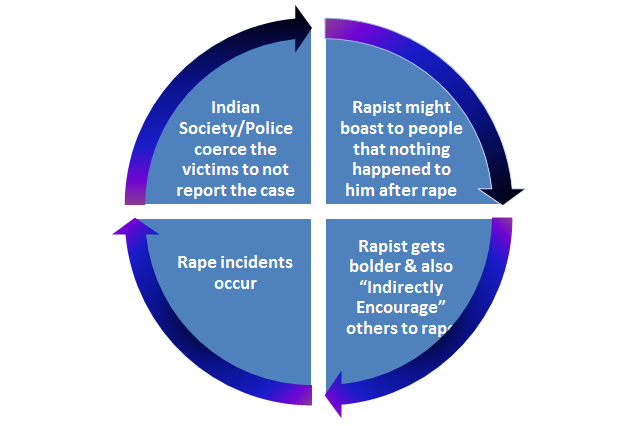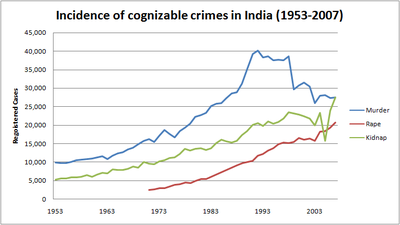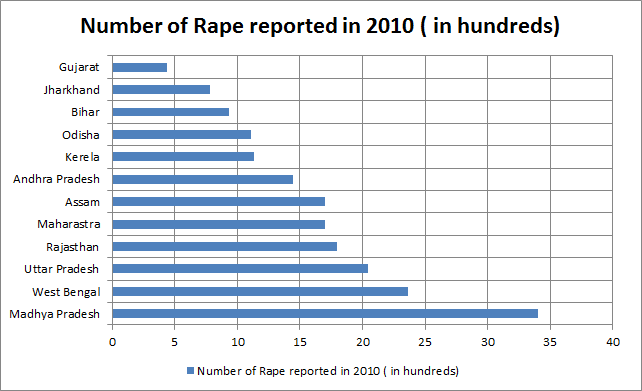A guest post by @shivoahm
The Delhi gang rape case shook the nation. Today morning, on 30th December, 2012, as I write this article, her dead body is in ashes. A 23-year old girl full of hope life forcibly pushed towards rape and death. A family who nurtured her for years, provided for her education with their limited resources, and prepared her to take on the family’s financial responsibilities suddenly now left wondering how this could have been avoided. As a citizen, each of us shudders to think this could easily have happened to my wife, or my sister, or my mother, or my girlfriend. Or if you’re a woman, it could have happened easily to yourself.
And yet, this is not an isolated incident. In the last few days, anyone who is watching news would have got imprinted in his/her mind this statistic that every 22 minutes a woman is raped in India. In 2011 alone, there were more 24,000 cases of rape reported across India. Next victim could be a 3-year old kid playing in her neighborhood or a 70-year old woman found alone. The victim could be in one of the mega-cities or somewhere in rural India, Bottom line is, NO ONE IS SAFE.
(Source: Wikipedia)
Stricter Punishment for rape?
More surprising than the rapes is the fact that this huge statistic of rapes happens to be in a country like India where the rape laws are one of the harshest. (See table below for amount of punishments for rape in various countries).
| Country | Rape Punishment |
| United States | Maximum sentence is life imprisonment, which could be equivalent to 30 years in jail. Severity of punishment based on factors such as use of violence, victim’s age. |
| China | Maximum punishment is the death penalty. But rape within marriage is still not criminalised, which is the case for many other countries, including Inida. |
| South Africa | Maximum sentence of 20 years in prison. But criminal procedure act now also includes oral and other forms of sexual violation. |
| Saudi Arabia | Invites prison terms, Lashing and floggings and even death penalty under Shariah. Most Muslim countries also punish rape victims for ‘illicit sex’. |
| India | Maximum punishment is life imprisonment for gangrape, 10 years for rape. Rape laws aren’t gender-neutral. Debate on to widen rape definition to include all kinds of penetration |
Let’s get it straight, people. We already made laws as strict as anyone in the world. Even stricter laws have not given us the results. There has to be something more to be done, much more merely making even more strict laws.
Also, when we are talking about stricter punishments we have to consider that the conviction rate of the rape cases is the lowest in India. The stricter punishment is not giving any benefits if there is no conviction at all.
These days, every politician talks about making rape laws stricter and then someone in the government would then compare the existing laws to other countries and conclude that we already made the laws stricter. If we made them any stricter, we should reach Taliban or Saudi Arabia style justice in India itself. This isn’t wrong statement, but this is only half-side of the story!
Iceberg-of-a-rape
More than the number of cases of sexual assaults that gets reported; much higher number of cases of rape and sexual assault cases go unreported. While, factually speaking, there can be no accurate number of sexual assault cases that were not reported at all. A few statements from the experts on this topic would be useful here, I thought.
Delhi-based psychologist Rajat Mitra, who heads Swanchetan that actively works on this issue, says: “People from the upper class and the middle class do not report rape cases. It is mostly the people from the lower class that come out to seek police intervention.” It is estimated that as many as 90 per cent of the rape cases actually remain unreported.
As many as 60 per cent of the rapists were neighbours, 16 per cent were friends/boyfriends and 11 per cent were relatives. Only two per cent of the cases involved strangers. It is worrying that the crime against women is growing as percentage of total Indian Penal Code crimes, with about 21,000 cases of rape reported in India in 2007, growing at the rate of 7 per cent. Of this, 405 cases were that of incest.
To get an international outlook on this, let’s see what the British authorities say about unreported rape cases.
Keir Starmer, the Director of Public Prosecutions, says that convictions for rape have reached record levels but the true number of offences is far greater. He said that while more than 300,000 women are sexually assaulted each year, only one in 10 victims of a serious offence reports it to the police.
Why rape cases go unreported?
In the Indian context, there are multitudes of reasons why the cases go unreported.
The social stigma attached with rape and sexual assault in a patriarchal society is too big to bear by a girl/woman or her family. Hence silence is more comfortable than going through the ordeal. 94% of the rapes are committed by someone known to the victim. So social pressure forces the girl to be silent.
We have all seen or heard the incidents where the police convince the rape victim to not report the crime. Recently on a TV sting, senior police officers were caught on hidden camera talking about survivors, saying: “She asked for it”; “It’s all about money”; “They have made it a business”; “It’s consensual most of the time”. In the sting, several police officers in over a dozen police stations were caught on spy cameras blaming everything from revealing clothes to having boyfriends or going to pubs as the main reasons for rape.
See the sting operation video below which tell the mindset of Police in India
http://www.youtube.com/share_popup?v=jqlz0795gUg
And every such time when we see such attitude, we ask the question: Do the Police really not see that the girl has been assaulted?? Or they don’t want to see it?
When I scratched below the surface, I noticed how the police is appraised while reporting to the government. The key parameter is the number of cases reported in each district or each police station which denotes the level of crime in the area. The Police officers are often under pressure not to register cases on account of political pressure from ruling parties keen to show that the law and order situation in their states is not bad. It does not matter which party comes to power, there is a constant pressure not to report the cases.
As a result, the police would try to somehow dissuade her from reporting an FIR. They would verbally insult and humiliate the victim. The threats from the rapists to the victim are ignored by police. There are cases where they force/suggest a marriage between rapist and victim. All this happens only because it helps them save their face in front of government and the media. And of course it saves them the trouble of filing the FIR, solving the case, and catching the rapists. In other words, they are ingrained to be apathetic!
To add to it, if there is less than 30% conviction rates of sexual assault cases, people will tend to lose faith in the system and not report things at all.
The medical procedures to verify the rape are very old and often add to stigma. I am quoting a report by a Human Rights group in India.
Rape survivors in India are still being subjected to controversial forensic examinations including the so-called “finger test”, says Human Rights Watch in a report published today. The author of the report told RNW that the practice is unscientific, degrading and leads to rape victims being abeled “loose women”.
The test is used to determine whether a rape survivor is sexually active, or as officials often state, ‘habituated to sexual intercourse’. It involves a doctor inserting one or two fingers in a rape victim’s vagina to determine the presence of the hymen and the ‘laxity’ of the vagina. If two fingers can pass, an examiner will often use this as proof that the woman is sexually active.
The test has been widespread since the mid-20th century. Its use dropped off after 2003 when India’s evidence law was amended to prohibit the cross-examination of rape victims based on “their general immoral character”. However, according to the HRW report, the test is still described in some medical jurisprudence textbooks and used in many cases.
The author of the report, Aruna Kashyap of Human Rights Watch India, told RNW that the test is often used to label victims as ‘loose women’, which makes it less likely that their attackers will be prosecuted “It’s humiliating for a woman to be identified as being ‘habituated to sex’ as it will be difficult for her to have the police take her complaint seriously”, she says
A former chief public prosecutor is quoted in the report as saying that “the finger test is relevant for the defence especially if the [rape victim] is unmarried. If the medical report says that two fingers have passed, the defence can show that she’s habituated [to sex]. This shakes the testimony of the victim”.
How Iceberg grows?
Now that we know that iceberg exists, let’s see how the iceberg grows. Try and imagine how a thief would react if he commits a huge theft and is never caught because there is “stigma” attached to reporting a theft. Yes, he would commit even more big thefts. Or let’s say a bully, if he comes to know that the victim would face stigma if he/she comes out and say he was bullied. Wouldn’t he/she bully even more? I am guessing the same mentality would that be of a rapist. If he is let go once, he would commit this crime once again and again, with another woman, another gal. Even in a developed country like Britain, the chief government officer says that the 9 out of 10 rape cases are unreported.
I can only imagine the situation of a country like ours where the stigma and khap panchayats add to the problem. The more the rapes go unreported, the more the iceberg grows further.
Breaking the cycle of “Iceberg-of-a-Rape”
The way to break this cycle is separate the “FIR reporting of case” and the “solving of rape case”. Police don’t register the FIR because they want to show lower numbers. Rapist might be a local strong man who has contacts in police and will prevent the registering of FIR. (See the website of Association for Democratic Reforms to see how many MLAs, MPs are facing rape charges). So the local strong man will also try to stop the rape victim from reaching the police station.
We have to make the reporting of FIRs for rapes to be done through 24-hour phone helplines managed by a social organization. Any woman can report the rape incident in the privacy of her own home and while talking to another woman on the phone. The phone discussion can be recorded and presented in court as evidence. Later a medical test in a hospital can be done based on the FIR number generated after this discussion.
The benefits of this process would be that-
- Victim will not be traumatized by talking to police. Police cannot stop the reporting of rape case
- Victim does not need to take permission from her father/mother or family before registering rape. The family cannot bring social barriers and prevent her from reporting. This is very important in cases where the rapist is known to the family and family resists going to police and asks victim to be silent and keep distance from rapist.
- Victim can get legal and medical advice from experts as soon as possible and anonymously.
- Independent NGO, which is not funded by government can track the number of rape cases. So the government cannot suppress the numbers and try to give a wrong image to citizens that “things are fine” when in actual sexual assault cases are on the rise!
The new process would be-
- The woman can call the helpline and report rape. She gets FIR registered through 24-hour phone helpline and she can get the FIR number. She submits the evidence through couriers etc.
- The medical examination can be done in a hospital based on the valid FIR registered number, without involvement of police till now.
- The medical report and the FIR number can be given to the police by the helpline after it has been registered.
- The benefit is that police cannot under-report the heinous crime in any way. And they are checked on how they are performing on the registered cases.
I have read a lot of articles suggesting that could be a mandatory filing of reports by police. And they can be penalized if the reports are not filed in immediately. I think this process will not work in India, given the level of mismanagement in Indian government police stations. Police stations will still not report rapes until some collector personally pushes them. This process of mandatory registering a complaint would simply force the victim to cry in front of collector instead of crying in front of the police officer and nothing else changes! So I would not recommend that.
Implications of separate FIR registering process
The immediate implication of making the registering of rape outside of police’s responsibility would be that there would be a huge visible spurt in number of rape cases reported. All the cases which are going unregistered will come to light.
The government and police would be under huge pressure to work on this and hence police and government ideally want to keep registering process within the government itself so that they can control it and hence control the public sentiment about rapes!
Ideally, a non-government funded NGO which is funded only by the women should take up this responsibility to set up a 24-hour help to register rapes and help with medical examination.
The most visible and important change would be that the rapist who thought he can go scot-free because the rape victim will never report or will never be heard, will for once think that he cannot go scot-free. Rapist or his friends cannot track if the victim physically and ensure that rape is not reported.
If we act together we can take that bully down.
It’s high time our women are given the respect that they deserve. This is the least we can do for the victim of Delhi Gang rape. This would be a true homage to that brave soul!
You can send your suggestions at Twitter (@shivoahm)
Sources:
Excerpts from a Book by SN Chaudhary-Human Rights and Poverty in India
http://infochangeindia.org/human-rights/books-a-reports/indian-police-a-law-unto-themselves.html
http://www.aljazeera.com/indepth/features/2012/12/20121228124356833971.html
http://indiatoday.intoday.in/story/The+iceberg+of+rape/1/46911.html
http://tehelka.com/the-rapes-go-on-how-do-we/
http://www.am2pmnews.com/world/india-world/comparison-of-indian-rape-law-to-rest-of-world.html
http://www.rnw.nl/english/article/india%E2%80%99s-rape-victims-face-degrading-examinations
http://www.dailymail.co.uk/news/article-2177524/Director-Public-Prosecutions-Keir-Starmer-Nine-rapes-unreported.html




